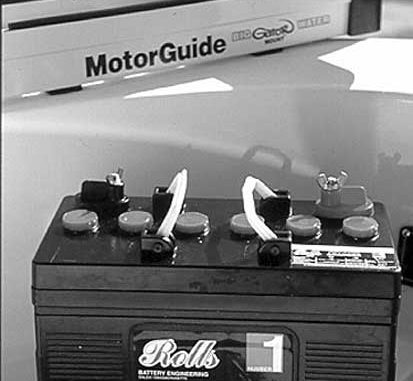
There’s no need to take a long run to catch all the speckled trout you could ever want.
Lots of fishermen think they save money when they go to a discount center and plunk down about $50 for each trolling motor battery they need. They did the same thing last year, and they’ll do it again next year.
Cheap trolling motor batteries are often little more than automotive models with marine labels and rope handles.
Getting a true picture of a battery’s cost requires looking at the big picture. If you pay $50 for a discount center battery and you have to replace it each season it costs you $50 a year.
A good flooded-cell battery that sells for $110 and lasts three years or more costs you $37 or less a year. A top AGM or gel battery that sells for $170 and lasts for five years or more costs you $34 or less per year.
I’m sure you get the idea: Cheap, one-season bargains are the most expensive batteries you can buy.
A battery with a higher initial price almost always comes with better engineering and components made of superior materials. They not only last longer, they deliver more trolling motor running time on each charge.
The Rolls batteries (800-487-0610) in my boat, for instance, cost about $230 each and had to be shipped, dry, from Oregon and filled with acid when they arrived.
That sounds like a lot of money until you consider that they are now five years old and on their second boat. My annual cost per battery is already less than $50, and they show no signs of slowing down. I expect them to last seven or eight years.
The batteries not only run the trolling motor longer between charges than the less-expensive batteries they replaced, they run it faster toward the end of a hard fishing day. That’s another fringe benefit, I guess, of using better materials.
Superior batteries don’t last any longer than cheap models unless they are maintained properly. My batteries are flooded cell, full-maintenance models, and I have to check water levels regularly and keep the battery tops clean and the terminals clean and tight. I also charge them immediately after use and keep them charged to avoid plate sulfation, a malady that kills neglected batteries long before their components wear out.
Some fishermen don’t want to bother with battery maintenance, especially if the batteries in their boats are difficult to access. They can still get better performance and longer life from high-quality, maintenance-free sealed batteries that use AGM or gel technology.
These batteries are usually heavier and more expensive per amp of stored power than comparable flooded models, but they require only proper charging and occasional terminal cleanings.
A down side for anglers wanting batteries with maximum storage capacity is that sealed batteries seldom have reserve capacity (RC) ratings as high as those on the best flooded cell batteries in the same group size.
Evertroll batteries are an extreme exception to this rule. Sealed in a steel case, they use nickel-zinc chemistry instead of lead-acid technology. The manufacturer says they can run twice as long on a charge, weigh 30 percent less and last up to five times longer than conventional deep-cycle batteries.
Their greatest benefit to my way of thinking is an almost flat power curve. Most lead-acid batteries spin your trolling motor prop slower toward the end of a fishing day, and you have to increase the motor’s speed setting to maintain the same boat speed.
Evertroll batteries turn your prop at about the same RPM at any given speed setting right up until they are completely discharged.
Evertroll batteries come with special chargers that replenish them in nine hours or less. They cannot be charged with an engine’s alternator or with chargers engineered for lead-acid batteries, so they aren’t suitable for use as engine cranking batteries.
If you are wondering why every fisherman you know isn’t running these batteries, it’s because of their price.
In the latest catalog from Cabela’s (800-237-4444), they sell for about $400 each.
Looking at the whole picture when shopping for batteries means spending less money and enduring the replacement hassle less often.


